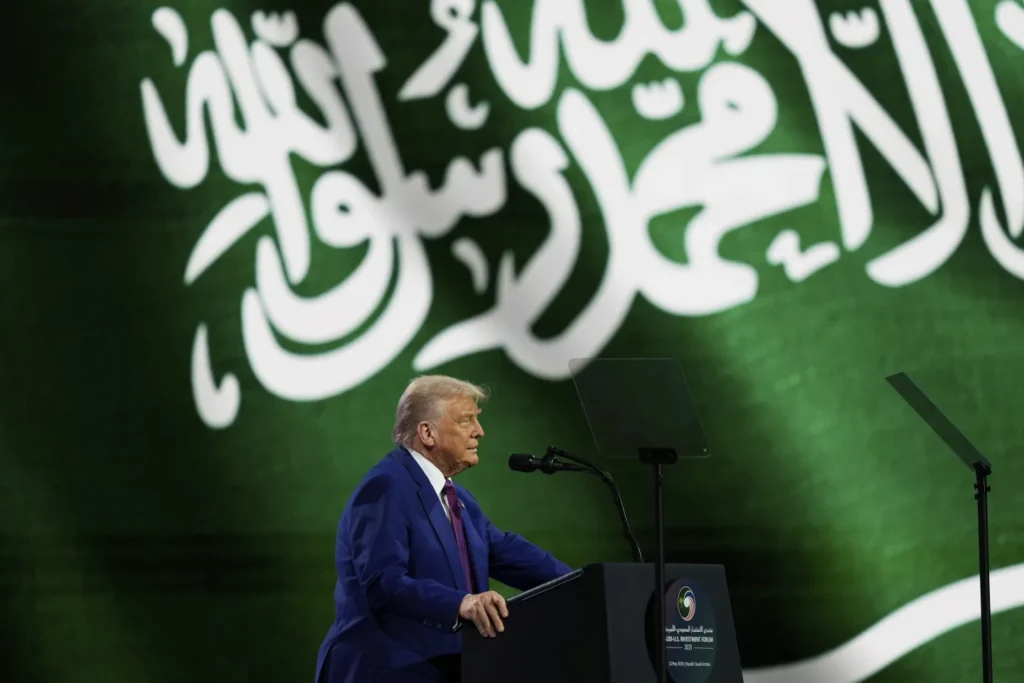RIYADH, Saudi Arabia — President Donald Trump announced Tuesday that his administration will begin easing sanctions on Syria and work toward normalizing relations with its new leadership, a dramatic shift in U.S. Middle East policy following the ouster of longtime strongman Bashar Assad.

The move comes ahead of a scheduled meeting between Trump and Syrian President Ahmad al-Sharaa, who rose to power earlier this year after leading an insurgent campaign that toppled the Assad regime. The diplomatic opening marks a sharp break from decades of U.S. hostility toward Damascus and is being framed by Trump as an opportunity to give Syria “a chance at peace.”
“There is a new government that will hopefully succeed,” Trump said during a press briefing. “I say, good luck, Syria. Show us something special.”
The announcement follows pressure from regional allies, particularly Saudi Crown Prince Mohammed bin Salman and Turkish President Recep Tayyip Erdogan, both of whom have thrown their support behind al-Sharaa’s government as a strategic counterweight to Iran’s influence in the war-torn country.
The U.S. has grappled with how to engage with al-Sharaa since his armed faction, Hayat Tahrir al-Sham (HTS), overran Damascus in a stunning offensive late last year, ending the Assad family’s 54-year rule. Al-Sharaa, a former militant with a controversial past, was named president in January.
Trump’s comments, and his planned meeting with al-Sharaa in Saudi Arabia, signal the strongest indication yet that the U.S. may recognize Syria’s new leadership, despite al-Sharaa’s past ties to extremist networks. Formerly known as Abu Mohammed al-Golani, al-Sharaa once fought U.S. forces in Iraq as part of al-Qaida’s insurgency and led its Syrian affiliate before renouncing formal ties to the group.
He still faces terrorism charges in Iraq, where a warrant for his arrest remains active. The U.S. previously offered a $10 million reward for information on his whereabouts.
Nevertheless, Gulf states see the new Syrian government as a buffer against Tehran, and have urged Washington to act quickly to strengthen ties with Damascus. Trump’s administration has not yet formally recognized the al-Sharaa government, and sanctions imposed under Assad remain in place, though Trump now appears ready to begin rolling them back.
The pivot has drawn criticism from Israel, a close U.S. ally, which remains deeply wary of al-Sharaa’s militant past and has warned against rapid normalization. Despite Israeli objections, Trump’s decision to engage directly with the Syrian president marks the first face-to-face meeting between a Syrian and American leader since Hafez Assad met President Bill Clinton in Geneva in 2000.
A White House official said Trump had “agreed to say hello” to the Syrian leader during his visit to Riyadh, though it remains unclear if formal recognition of the new government is imminent.
Analysts say the potential diplomatic thaw could reset decades of hostile relations between Washington and Damascus, which were shaped during the Cold War and deepened during Syria’s alliance with Iran in the aftermath of the U.S. invasion of Iraq.
Ibrahim Hamidi, editor-in-chief of Al Majalla and a leading Syrian affairs analyst, called the development a “strategic shift” with far-reaching implications.
“The Syrian-American meetings in Riyadh open the gate for the two sides to start discussing issues of disagreement between them in a positive atmosphere,” Hamidi said. “This is important.”
Whether this rapprochement will lead to a complete diplomatic restoration remains uncertain, but the gesture reflects Trump’s willingness to reshape U.S. alliances and adversaries in pursuit of what he calls a “deal for stability” in the Middle East.



